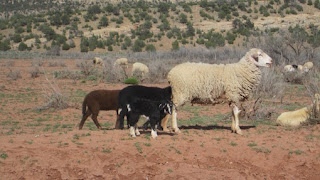 Last spring our church suffered major water damage. The
insurance company finally gave the go-ahead to clean and repair what we could; and
on church workday, it became our job to find a home for a cart of volleyballs.
As we discussed where to stash them, a retired Navajo man asked for two
volleyballs. Why? He uses them when herding his sheep. If the sheep strays off,
he’ll lob the ball in that direction to turn the skittish creature.
Last spring our church suffered major water damage. The
insurance company finally gave the go-ahead to clean and repair what we could; and
on church workday, it became our job to find a home for a cart of volleyballs.
As we discussed where to stash them, a retired Navajo man asked for two
volleyballs. Why? He uses them when herding his sheep. If the sheep strays off,
he’ll lob the ball in that direction to turn the skittish creature.
Shepherding has been an integral part of Navajo culture
since the Spanish introduced sheep around 1600.
Before that, Navajos were farmers and hunter/gatherers. By the 1800s,
shepherding had assumed parity with farming in Navajo lives. Two appalling times
in their history the sheep population was severely diminished: first in 1863
when Kit Carson was given the order to subjugate the Indians by any means and
secondly in the 1930s when the Indian Bureau and the Soil Conservation Bureau
exterminated sheep because of “overgrazing.”
(The owners were not compensated, and wool was left on the slaughtered sheep.)
Sheep are the most important livestock because they supply
wool for rug weaving and meat for food. But it is becoming increasingly
difficult to find Navajo-grown mutton. These days, though most Navajos own a
few sheep, there are relatively few shepherds on the Reservation. The entire
sheep population is estimated to be around 6000. The shepherds’ children and
grandchildren will be seeking employment involving a computer.
 |
| We stopped our car to chat with the shepherds. |
 The children at Hilltop understand Biblical references to
sheep and shepherds because it is imbedded in their culture. They think it’s
great that Jesus ate mutton. They can understand the comparison of a good
shepherd and a mediocre one. They’ve heard about the helplessness of the sheep
and the love of the shepherd, thereby making this a valuable bridge in teaching
about Jesus.
The children at Hilltop understand Biblical references to
sheep and shepherds because it is imbedded in their culture. They think it’s
great that Jesus ate mutton. They can understand the comparison of a good
shepherd and a mediocre one. They’ve heard about the helplessness of the sheep
and the love of the shepherd, thereby making this a valuable bridge in teaching
about Jesus.
The pastors here on the Rez are also seeking wisdom in
feeding their flocks and winning others to the Lord. I know many are interested
in some results from the Pastors’ Summit last weekend. Our director, Chuck
Harper, posted a letter on the Internet that summarizes the event. Here is the
link for the Newsletter:
·
Please remember Mr. Naas who has just recently
come aboard as part of the Hilltop Christian School Administrative team – that
he would get up-to-speed quickly.
·
Pray for the entire Naas family to adjust to living here in Arizona.
·
Pray for Mrs. H. She has a challenging group, and this is her first year as a
classroom teacher.
Roger and Sara
Blog: https://everettnavajo.blogspot.com
Support: Western Indian Ministries: http://www.westernindian.org/donate2/
P.O. Box 9090, Window Rock, AZ 86515

No comments:
Post a Comment